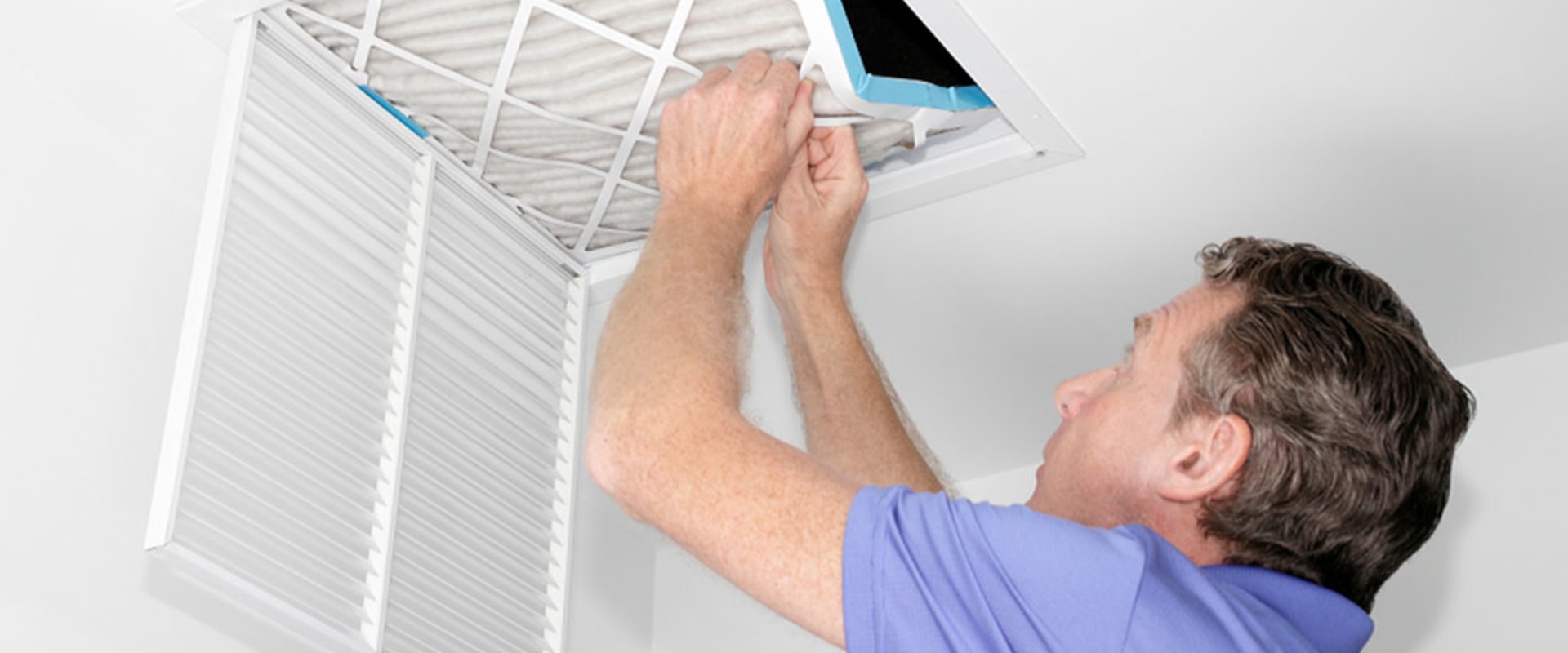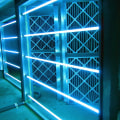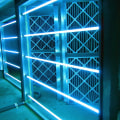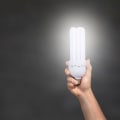HVAC Air Filters for Home
When it comes to maintaining a comfortable and healthy indoor environment, HVAC air filters play a crucial role. These unassuming devices quietly work behind the scenes, purifying the air we breathe and ensuring that our homes remain free from dust, allergens, and other contaminants. But how do these filters work, and why is it important to regularly change them? In this discussion, we will explore the different types of HVAC air filters, delve into the factors to consider when choosing one and uncover the numerous benefits they bring to our homes. So, let's take a closer look at the world of HVAC air filters and discover how they can improve the air quality in our living spaces.
Types of HVAC Air Filters
There are various types of HVAC air filters available for home use. When it comes to choosing the best option for your home, it is important to consider the different types of filters and their specific features.
One of the most common types of HVAC air filters is the fiberglass filter. These filters are inexpensive and have a basic design. They are made of layered fiberglass fibers that capture large particles such as dust and debris. However, they are not as effective at trapping smaller particles such as pollen and pet dander.
Another type of air filter is the pleated filter. These filters have a larger surface area than fiberglass filters, which allows for better particle capture. Pleated filters are made with a folded design that increases their efficiency. They are capable of trapping smaller particles and provide better overall air quality.
For those with allergies or asthma, a high-efficiency particulate air (HEPA) filter is the best option. These filters can capture up to 99.97% of particles as small as 0.3 microns. HEPA filters are highly effective at removing allergens, dust mites, and other airborne contaminants.
Importance of Regularly Changing Air Filters
Regularly changing air filters is crucial for maintaining the efficiency of HVAC systems and improving indoor air quality. Over time, filters accumulate dust, pollen, pet dander, and other airborne particles, reducing their effectiveness and restricting airflow. By replacing filters at the recommended intervals, homeowners can ensure optimal performance, prolong the lifespan of their HVAC system, and enjoy the health benefits of clean air in their homes.
Filter Lifespan and Efficiency
To ensure optimal performance and air quality in your home, it is essential to regularly change the HVAC air filters. Here are some key reasons why filter lifespan and efficiency are important:
Filter replacement frequency: Air filters should be replaced according to the manufacturer's recommendations or more frequently if you have pets, allergies, or live in a dusty environment. Neglecting to change filters regularly can lead to decreased efficiency and poor air quality.
Improved air quality: Over time, air filters become clogged with dust, pollen, pet dander, and other particles. Regularly changing filters ensures cleaner air by trapping and removing these contaminants, reducing the risk of respiratory issues and allergies.
Energy efficiency: A clean air filter allows for better airflow, improving the efficiency of your HVAC system. This can lead to lower energy consumption and reduced utility bills.
Common air filter problems: Neglected filters can become damaged or ineffective, leading to issues such as reduced airflow, frozen evaporator coils, and even system breakdowns. Regular filter changes can prevent these problems and extend the lifespan of your HVAC system.
Health Benefits of Clean Air
Clean air is essential for maintaining good health, and regularly changing air filters play a crucial role in ensuring the air in your home remains free from contaminants. Indoor air pollution can have a significant impact on respiratory health, especially for individuals with allergies or asthma. Air filters help to remove harmful particles, such as dust, pollen, pet dander, and mold spores, from the air, reducing the risk of respiratory issues and improving the overall air quality. By regularly changing air filters, you can ensure that they are working efficiently and effectively, preventing the buildup of these contaminants in your home. This proactive approach to maintaining clean air can lead to better respiratory health and a healthier living environment for you and your family.
Factors to Consider When Choosing Air Filters
When selecting HVAC air filters for your home, it is important to carefully consider various factors. These factors will help you choose the most suitable air filter that meets your specific needs. Here are four key factors to consider when purchasing air filters:
Filtration Efficiency: The primary purpose of an air filter is to remove airborne particles from the air. Look for filters with a high Minimum Efficiency Reporting Value (MERV) rating. The higher the rating, the more efficient the filter is at capturing particles of different sizes.
Filter Type: There are various types of air filters available, including fiberglass, pleated, and electrostatic filters. HEPA (High-Efficiency Particulate Air) filters are highly effective in trapping tiny particles and allergens, making them an excellent choice for those with allergies or respiratory conditions.
Maintenance Requirements: Consider the maintenance needs of different air filters. Some filters require frequent replacements, while others can be cleaned and reused. Take into account the cost and effort involved in maintaining the filter.
Airflow and System Compatibility: Ensure that the air filter you choose is compatible with your HVAC system. Consider the airflow needs of your system and select a filter that does not impede the proper functioning of the system.
How HVAC Air Filters Improve Indoor Air Quality
Air filters in HVAC systems play a crucial role in enhancing the indoor air quality of a home. By trapping and removing common air pollutants, these filters help create a healthier and more comfortable living environment for residents. Maintaining the filters is essential to ensure their effectiveness in improving indoor air quality.
Regular filter maintenance is necessary to prevent the buildup of dirt, dust, and other airborne particles. Over time, these pollutants can clog the filters, reducing their efficiency and allowing contaminants to circulate throughout the home. By cleaning or replacing the filters as recommended by the manufacturer, homeowners can ensure that their HVAC system continues to effectively filter out pollutants and maintain good indoor air quality.
HVAC air filters are designed to capture various common air pollutants, including dust, pollen, pet dander, mold spores, and bacteria. These particles can trigger allergies, asthma, and other respiratory issues, particularly in individuals who are sensitive to them. By removing these pollutants from the air, HVAC filters help reduce the risk of respiratory problems and improve overall health and well-being.
In addition to removing common air pollutants, HVAC filters also help control odors by trapping airborne particles that can cause unpleasant smells. This is especially important in households with pets, smokers, or cooking activities that can generate strong odors.
Benefits of Using High-Efficiency HVAC Air Filters
Using high-efficiency HVAC air filters provides several benefits for homeowners. Firstly, it improves indoor air quality by trapping a higher percentage of airborne particles such as dust, pollen, and pet dander. Secondly, it promotes energy efficiency by allowing the HVAC system to operate more effectively, reducing the strain on the system and lowering energy consumption. Lastly, high-efficiency filters can extend the lifespan of the HVAC system by preventing the accumulation of debris and reducing the risk of damage.
Improved Indoor Air Quality
By utilizing high-efficiency HVAC air filters, homeowners can significantly enhance the quality of their indoor air. Here are four ways in which these filters can improve indoor air quality:
Removal of airborne pollutants: High-efficiency HVAC air filters are designed to capture a wide range of airborne pollutants, such as dust, pollen, pet dander, and mold spores. These filters have a higher MERV (Minimum Efficiency Reporting Value) rating, which means they can trap smaller particles more effectively, resulting in cleaner air.
Reduction of allergens: With their superior filtration capabilities, high-efficiency air filters can help reduce allergens in the indoor environment. This is particularly beneficial for individuals who suffer from allergies or asthma, as it can alleviate symptoms and improve overall respiratory health.
Prevention of respiratory illnesses: By removing airborne pollutants and allergens, high-efficiency HVAC air filters can help prevent respiratory illnesses. Breathing in clean air can reduce the risk of developing respiratory conditions, such as bronchitis or respiratory infections.
Improved overall health and well-being: Clean air is essential for maintaining good health and well-being. High-efficiency air filters can provide a healthier indoor environment by reducing the presence of harmful particles, improving air circulation, and promoting better respiratory function.
Energy Efficiency Savings
Utilizing high-efficiency HVAC air filters not only improves indoor air quality but also offers significant energy efficiency savings for homeowners. By using filters that are designed to capture smaller particles, such as dust, pollen, and pet dander, these high-efficiency filters can help reduce the workload on the HVAC system. As a result, the system will require less energy to operate, leading to energy savings and lower utility bills. Moreover, these filters are cost-effective as they can help extend the lifespan of the HVAC system by preventing dirt and debris from accumulating and causing damage to the system. Therefore, investing in high-efficiency HVAC air filters is a wise choice for homeowners looking to improve energy efficiency and achieve long-term cost savings.
Extended HVAC System Lifespan
High-efficiency HVAC air filters offer significant benefits by extending the lifespan of the HVAC system. By reducing the amount of dust, dirt, and debris that enters the system, these filters help to maintain the cleanliness of crucial components, such as the coils and blower motor. As a result, the system can operate more efficiently and effectively, reducing the strain on the equipment and minimizing the risk of breakdowns.
Here are four specific benefits of using high-efficiency HVAC air filters:
Reduced wear and tear: Common air filter problems, such as clogs and blockages, can lead to increased energy consumption and strain on the system. High-efficiency filters prevent these issues, allowing the HVAC system to operate smoothly.
Improved airflow: A clean air filter ensures proper airflow throughout the system, preventing the accumulation of dust and debris that can restrict airflow and strain the system.
Enhanced energy efficiency: When the HVAC system operates efficiently, it consumes less energy, leading to lower utility bills and reduced environmental impact.
Extended equipment lifespan: By reducing the strain on the system, high-efficiency filters can help prolong the lifespan of the HVAC equipment, saving homeowners money on costly repairs and replacements in the long run.
How to Properly Install HVAC Air Filters
To ensure optimal performance and efficiency of your HVAC system, it is essential to properly install HVAC air filters. The installation process involves specific techniques to ensure that the filters are correctly fitted and functioning effectively.
One of the most common installation mistakes is neglecting to check the size of the filter. It is crucial to measure the dimensions accurately and select a filter that matches the size requirements of your HVAC system. Installing an ill-fitting filter can lead to air leakage, bypassing the filtration process and reducing the system's overall efficiency.
Another common mistake is failing to orient the filter correctly. Most filters have arrows indicating the direction of airflow. It is crucial to install the filter with the arrows pointing in the direction of the airflow, ensuring that it captures and filters the air effectively.
When installing the filter, make sure to clean the filter housing thoroughly. Accumulated dust and debris can hinder the filter's performance and reduce its lifespan. Regularly vacuuming or wiping down the housing can help maintain optimal airflow and prevent clogging.
Tips for Maintaining HVAC Air Filters
Proper maintenance of HVAC air filters is essential for ensuring the longevity and efficiency of your system, building on the importance of correct installation techniques. Here are some tips to help you maintain the filter efficiency and address common filter problems:
Regularly clean or replace filters: Dust, dirt, and debris can accumulate on the filters over time, causing them to become clogged and less effective. It's important to clean or replace the filters every one to three months, depending on the manufacturer's recommendations and the level of pollutants in your home.
Check for damage: Inspect the filters regularly for any signs of damage, such as holes or tears. Damaged filters can allow contaminants to bypass the filtration system, reducing its efficiency. If you notice any damage, replace the filters immediately.
Keep the area around the filters clean: Dust and debris can accumulate around the filters, hindering their performance. Make sure to clean the area surrounding the filters regularly to prevent any obstructions.
Consider upgrading to higher efficiency filters: If you have allergies, asthma, or other respiratory conditions, you may want to consider using higher efficiency filters, such as HEPA filters. These filters can capture smaller particles and provide better air quality.
Frequently Asked Questions
Can HVAC Air Filters Help Reduce Allergies and Asthma Symptoms?
HVAC air filters play a crucial role in improving indoor air quality and can significantly reduce allergies and asthma symptoms. They effectively remove airborne particles and allergens, creating a healthier environment for respiratory health.
How Often Should I Clean or Replace My HVAC Air Filters?
The cleaning frequency and filter replacement schedule for HVAC air filters vary depending on factors such as filter type, usage, and air quality. It is recommended to consult the manufacturer's guidelines or seek professional advice for specific recommendations.
Can Using High-Efficiency HVAC Air Filters Help Reduce Energy Consumption?
Using high-efficiency HVAC air filters can help reduce energy consumption by improving the airflow and reducing the strain on the system. This not only leads to energy savings but also increases the lifespan of the HVAC system, making it a cost-effective choice for homeowners.
Are There Any Specific Air Filters Recommended for Households With Pets?
When considering air filters for households with pets, it is important to choose the best air filters that can effectively capture pet dander and allergens. Using air filters in homes with pets can provide several benefits such as improved indoor air quality and reduced allergic reactions.
Can HVAC Air Filters Help Reduce Odors in the Home?
HVAC air filters can effectively reduce odors in the home. By trapping and removing particles and contaminants, these filters help improve indoor air quality and create a fresher, cleaner living environment.
Here is the nearest branch location serving the Miami Shores area…
Filterbuy HVAC Solutions - Miami FL
1300 S Miami Ave Unit 4806, Miami, FL 33130
(305) 306-5027
https://maps.app.goo.gl/McXSNwHD9otb6ETq8
Here are driving directions to the nearest branch location serving Miami Shores…



